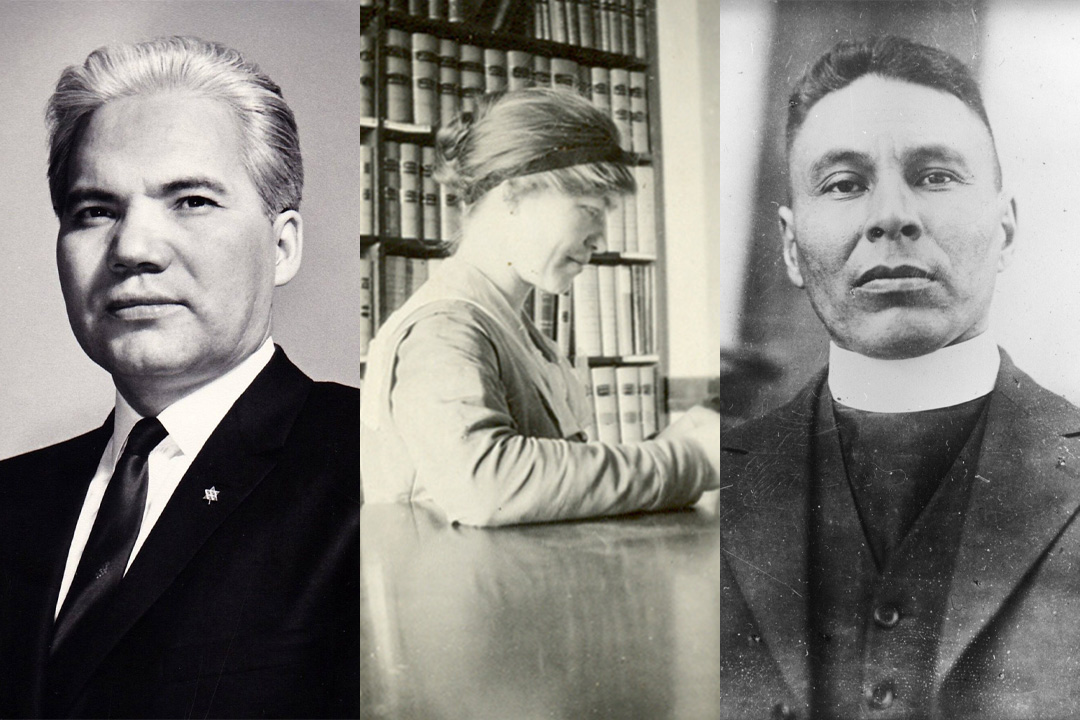
National Indigenous History Month: USask moments and milestones
In honour of National Indigenous History Month in June, On Campus News takes a look at some of the influential Indigenous individuals and achievements in the history of the University of Saskatchewan (USask).
By James ShewagaAs the first Indigenous male and female students in the early years of the University of Saskatchewan (USask), Edward Ahenakew and Annie Maude (Nan) McKay helped show the way for hundreds of First Nations and Métis graduates walking across the stage at Merlis Belsher Place this week to receive their degrees at Spring Convocation.
Ahenakew became part of USask history when he enrolled in university classes as a theology student in 1910 and graduated two years later as a member of the affiliated Emmanuel College, going on to become an ordained Anglican priest and working tirelessly in support of Indigenous causes and communities. Meanwhile, McKay came to campus in 1912 and graduated three years later with a Bachelor of Arts degree as the first Métis student and first female Indigenous scholar, before beginning a remarkable 44-year career in the University Library until her retirement in 1959.
“The stories of Nan McKay and Edward Ahenakew as the first Indigenous students at the University of Saskatchewan are an inspiration to this day, and remind us of the remarkable contributions of Indigenous people at the university dating back more than a century,” said USask Vice-Provost, Indigenous Engagement, Dr. Angela Jaime (PhD). “Their legacy and their journeys more than a hundred years ago provided a path to follow for future Indigenous students.”
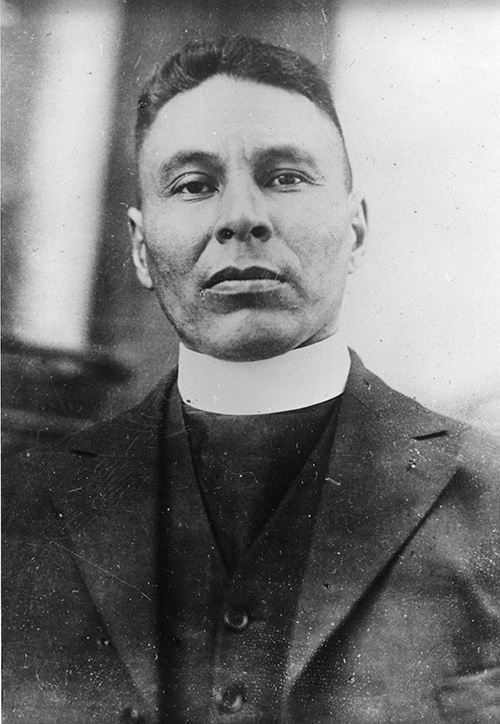
Born in Sandy Lake, Sask., in 1885, Reverend Ahenakew went on to have a long career working in communities across the province, helping produce a Cree-English language dictionary as well as a monthly newsletter, and serving as an early Indigenous advocate for land, hunting, trapping, and fishing rights, through the League of Indians of Canada. A spiritual and political leader, Ahenakew lobbied for better economic and health support for Indigenous peoples and against the destructive education policies and practices of the residential school system, until his passing in 1961.
Meanwhile, McKay was born in 1892 in Fort à la Corne, Sask., and came to university in 1912 after being awarded a scholarship. She quickly became active in the student council and the executive of the YWCA, Pente Kai Deka sorority, the Literacy Society, and The Sheaf student newspaper, while also playing for the university’s women’s hockey team. While working as a librarian at USask, she also served as a volunteer nurse on campus during the Spanish Flu pandemic of 1918. McKay passed away in 1986 at the age of 93, and in 2007 was named one of USask’s 100 Alumni of Influence.
Nan McKay was the niece of James McKay, a Métis lawyer originally from Manitoba who was appointed to USask’s first Board of Governors back in 1908, while he was the chancellor of Emmanuel College. Called to the bar in Winnipeg in 1886, he moved west to practice law in Prince Albert the following year and went on to a distinguished career as both a lawyer and a judge in Saskatchewan. McKay was elected Member of Parliament for Prince Albert in the House of Commons from 1911-1914, and also served on the university’s Board of Governors for 23 years until his passing in 1931.
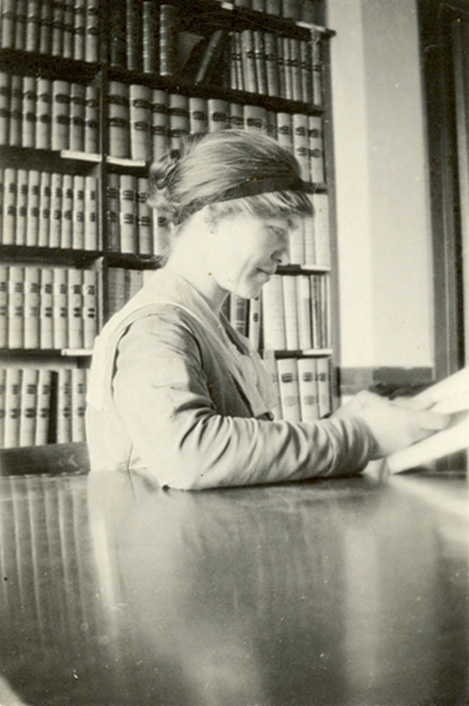
Following in those early footsteps, a young William Wuttunee came to campus a few years later and graduated from USask’s College of Law in 1952. He would go on to became the first Cree lawyer to be called to the bar in Western Canada, beginning a remarkable career as a lawyer and advocate for Indigenous people, passionately pressing for the right to vote, self-determination, and reconciliation.
“As the first Indigenous lawyer called to the bar in Western Canada and the first Indigenous graduate of the College of Law, William Wuttunee was not only a trailblazer but a visionary champion of Indigenous rights throughout a remarkable career that started here at the University of Saskatchewan,” said Martin Phillipson, dean of USask’s College of Law. “He worked tirelessly to support Indigenous peoples and communities and played a role in the early days of establishing what would become the Assembly of First Nations and the Federation of Saskatchewan Indian Nations, and later served as an Elder and advisor in the establishment of the Truth and Reconciliation Commission of Canada. He was truly one of a kind and we are honoured to remember him as a member of our alumni family.”
Wuttunee’s journey began on the Red Pheasant First Nation, born on May 8, 1928, into a family of 13 children. Raised on the First Nation, Wuttunee was forced to leave to attend residential school, experiences he never told his family about until decades later when the Truth and Reconciliation Commission of Canada was established. A gifted student, Wuttunee earned his law degree at USask and began a career dedicated to Indigenous rights until his passing in 2015, at the age of 87.
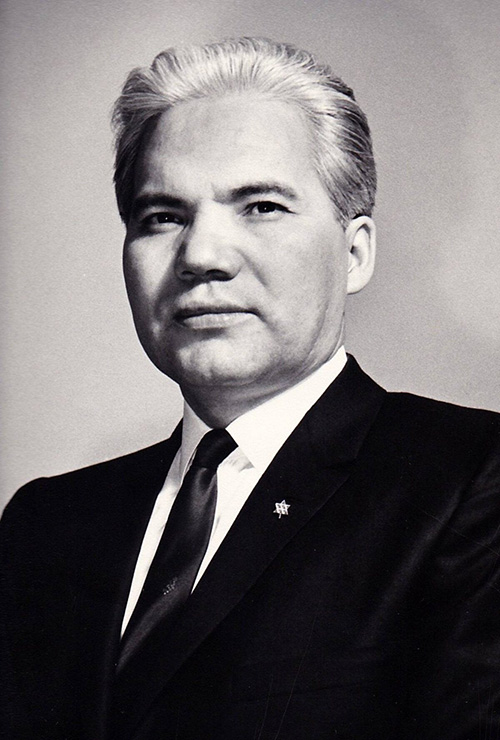
Among his many achievements, Wuttunee organized a meeting of provincial chiefs in 1958 that resulted in the creation of the Federation of Saskatchewan Indians – now the Federation of Sovereign Indigenous Nations – and led the push for status Indians to be granted the right to vote, passed by Premier Tommy Douglas’s provincial government and enacted by the federal government in 1960. In 1961 he co-founded and was named first Chief of the National Indian Council – now known as the Assembly of First Nations – and later became the first Indigenous lawyer to appear before the Supreme Court of Canada, as well as the Joint Committee of the House and Senate on Indian Affairs.
In his later years following private practice, Wuttunee served as an Elder advisor from 2007-2010 to oversee thousands of residential school claims for the Truth and Reconciliation Commission of Canada. In 2009 he also joined Indigenous leaders and residential school survivors who travelled to the Vatican to receive an apology from Pope Benedict for the harms “perpetrated against native children in residential schools.”
That dedication to advancing Indigenous rights was also led on campus by the work of the likes of Dr. Marie Battiste (EdD), Dr. Priscilla Settee (PhD) and Dr. Verna St. Denis (PhD), among many others. That university commitment has been supported by USask initiatives like the Mission, Vision and Values statement, the University Plan 2025 unveiled in 2018, USask’s Equity, Diversity and Inclusion policy adopted in 2020, and the Indigenous Strategy, ohpahotân | oohpaahotaan (“Let’s Fly Up Together”) gifted to the university by Elders in 2021.
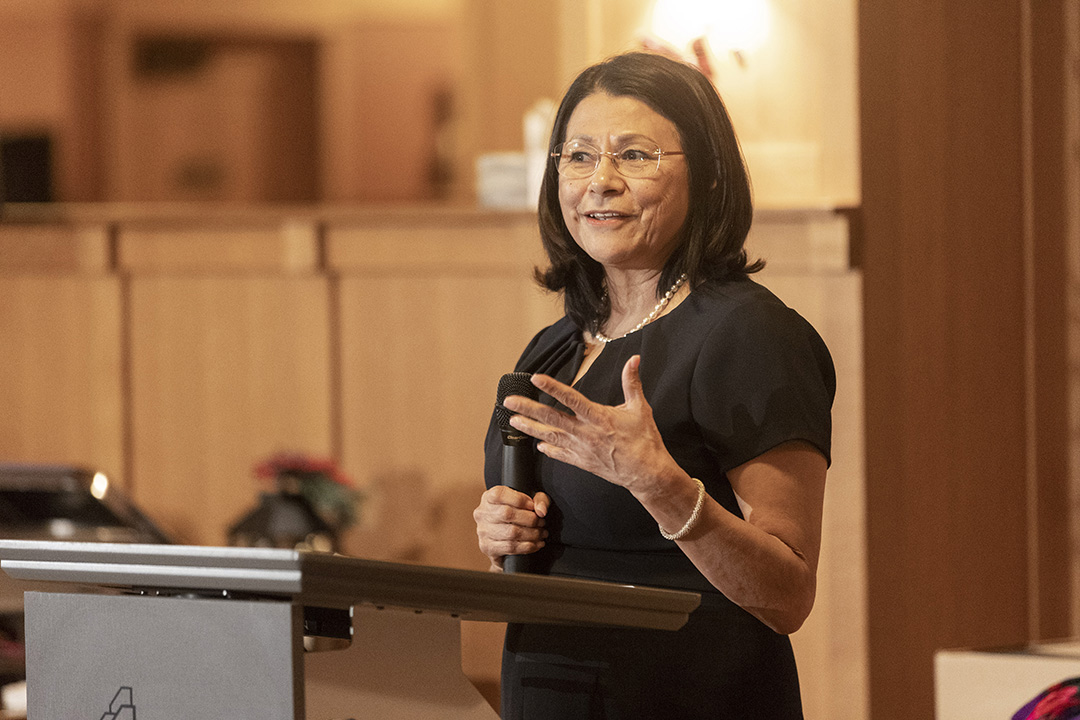
In 2021, St. Denis was also named special advisor to the president on anti-racism and anti-oppression in a commitment to transformative decolonization leading to reconciliation. St. Denis, who came to campus as a student in 1978 and went on to serve more than three decades as a professor in the College of Education, began co-leading anti-racism education with senior diversity and inclusion consultant Liz Duret three years ago. Following initial work with USask senior leaders as mandated by President Peter Stoicheff, the anti-racism sessions have been expanded to faculty and staff across campus. While St. Denis officially retired in 2022, Duret has continued that work with a growing list of USask employees.
A member of Beardy’s and Okemasis Cree Nation, St. Denis graduated from USask back in 1982 with a Bachelor of Education and went on to work as an instructor in the Indian Teacher Education Program (ITEP), the Saskatchewan Urban Native Teacher Education Program (SUNTEP), and the Department of Educational Foundations until her retirement last year.
Capping her career by beginning anti-racism education has helped provide a pathway to progress for the university on the road to reconciliation.
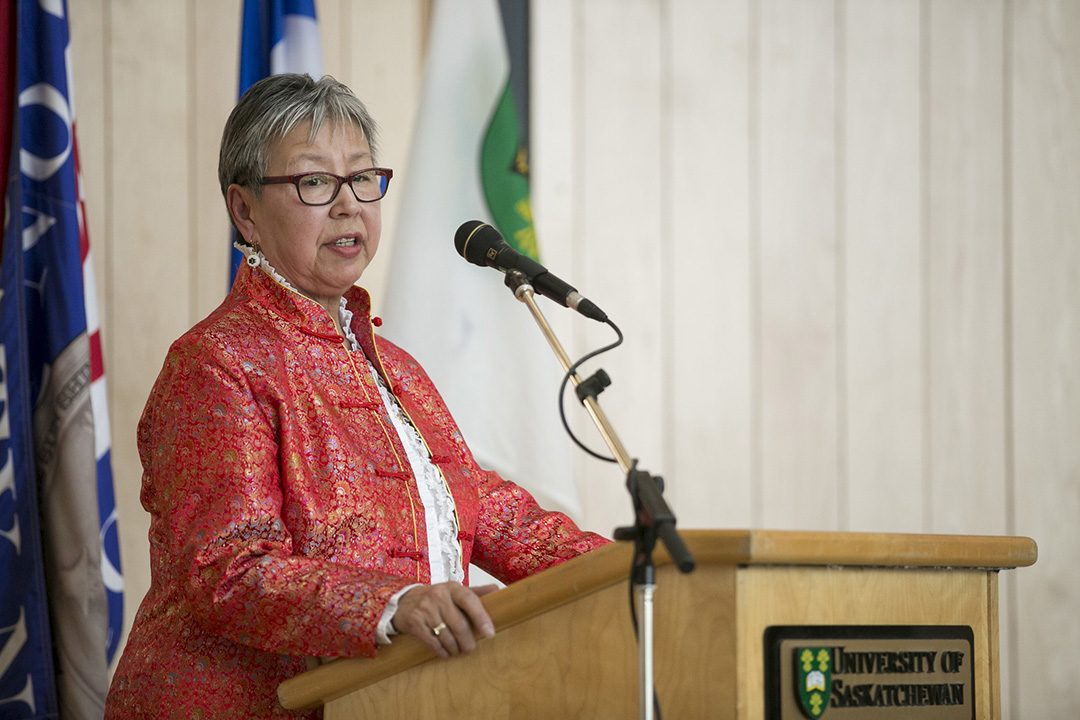
“There is literature that is starting to come out — a framework for what we need to do to have an anti-racist university — and it is validating because it’s what we have started. Scholars recommend that you have to start with the leadership, and we are doing that … So it’s a good start, but we need to do more,” said St. Denis in an interview with On Campus News.
In December 2022, the Office of the Vice-Provost Indigenous Engagement celebrated St. Denis’s memorable career with a retirement party to honour her nearly four-decade association with the university.
“This place will always have a special spot in my heart,” St. Denis told Meagan Hinther of the College of Education in an interview last spring. “I grew up here. I came when I was 20. And I never imagined that I would spend a good part of my life here. It’s been an honour.”
Here is a look at some of the other influential Indigenous individuals and memorable moments in history at USask:
2023: USask and the Johnson Shoyama Graduate School of Public Policy (JSGS) partnered with Métis Nation–Saskatchewan to establish a JSGS Research Chair in Métis Governance and Policy—the first of its kind in Canada. Appointed was professor Dr. Kurtis Boyer (PhD), advisor to USask’s Office of the Vice-Provost of Indigenous Engagement.
2022: The university’s Board of Governor’s approved the deybwewin | taapwaywin | tapwewin Indigenous Truth policy, focused on Indigenous citizenship/membership verification through documentation. The policy was created with the guidance of Elders, Knowledge Keepers, Language Teachers, and other Indigenous community and campus leaders.
2021: The Indigenous Strategy, ohpahotân | oohpaahotaan (“Let’s Fly Up Together”), was gifted by Elders to USask in a ceremony on Aug. 20. It was an historic event for USask, which celebrated the first Indigenous Strategy created solely by Indigenous people at a Canadian U15 research institution.
2021: Lindsay Knight, a PhD student in the Department of Indigenous Studies at USask, became the first Indigenous Storyteller-in-Residence in the University Library, the first position of its kind at USask and unique in the province. Knight, also known as Eekwol, is an award-winning hip-hop artist with nine album releases to her credit.
2018: USask officials unveiled University Plan 2025 to be The University The World Needs, weaving a commitment to Indigenization and Reconciliation throughout all aspects of the plan, which was gifted the Indigenous names
nīkānītān manācihitowinihk in Cree and ni manachīhitoonaan in Michif, which translate to “Let us lead with respect.”
2016: The grand opening of the Gordon Oakes Red Bear Student Centre was held on Feb. 3, 2016. Named in honour of the spiritual and community leader and former Chief of Nekaneet First Nation, the centre is dedicated to supporting the personal, social, cultural, and academic success of Métis, First Nations and Inuit students at USask.
2015: USask hosted the first national reconciliation forum—Building Reconciliation: Universities Answering the TRC's Calls to Action—drawing Canadian university presidents and leadership teams, First Nations and Métis leaders, student leaders, and Indigenous scholars. The university has since hosted seven annual māmowi āsohtētān internal forums.
2013: Blaine Favel was named chancellor of USask, the first Indigenous person to serve in the position, from 2013-2016. Favel was Chief of Poundmaker Cree Nation and Grand Chief of the FSIN, worked as a senior diplomat on Indigenous issues for the Department of Foreign Affairs, and was a panelist on the Truth and Reconciliation Commission of Canada.
2005: The Honourable Dr. Lillian Dyck (PhD), a former USask neuropsychiatry professor who earned her bachelor’s (1966), master’s (1970) and PhD (1981) at USask, became the first First Nations woman appointed to the Senate. A member of George Gordon First Nation, Dyck was named an Officer of the Order of Canada in 2021.
1988: The first powwow at USask was held in The Bowl in spring of 1988, shifting to the fall in 1990 for the first Welcome Week Powwow. In 2010, it returned to spring as the Graduation Powwow to celebrate the academic achievements of Indigenous graduates, and in 2023 moved back to fall as the Welcome Back Powwow and Métis Dance Celebration.
1983: The Department of Indigenous Studies – originally known as the Department of Native Studies – was established 41 years ago in USask’s College of Arts and Science. The department began offering a complete graduate program in 1997 and is dedicated to engaging with Indigenous communities at the local, national and international level.
1980: The Saskatchewan Urban Native Teacher Education Program (SUNTEP) was established at USask for Métis and non-status Indigenous students, offered in conjunction with the Gabriel Dumont Institute and the University of Regina. SUNTEP is a four-year accredited direct-entry bachelor program offered through the College of Education.
1973: USask’s College of Law established the country’s first Native Law Centre summer program 51 years ago, helping train three out of every four Indigenous lawyers practicing law in Canada. The centre is now known as the Wiyasiwewin Mikiwahp Native Law Centre after adopting the Cree words for “law lodge” in a ceremony with Elders on May 18, 2018.
1972: The university established the Indian Teacher Education Program (ITEP), which is considered the longest-running Indigenous-focused program at USask. The four-year program was designed for First Nations students to earn a Bachelor of Education degree. Elders honoured the first ITEP graduates with a special pipe ceremony in 1976.
1967: The first National Conference on Indian and Northern Education was held in Saskatoon. The conference was the result of a collaboration between the university’s former Indian and Northern Education program (INEP) and the Society for Indian and Northern Education (SINE) and featured First Nations, Mtis and Inuit speakers from across Canada.
1966: Dr. Howard Adams (EdD) was hired by USask’s College of Education after becoming the first Canadian Métis student to earn a PhD, at the University of California, Berkeley. A USask professor for 10 years, he was elected president of the Métis Society of Saskatchewan in 1969 and was presented with a National Aboriginal Achievement Award in 1999.
Together, we will work towards Truth and Reconciliation. We invite you to join by supporting Indigenous achievement at USask.

